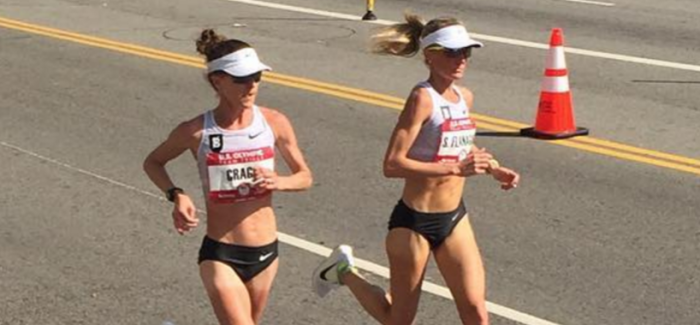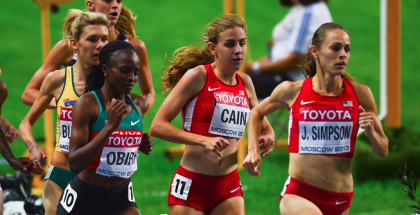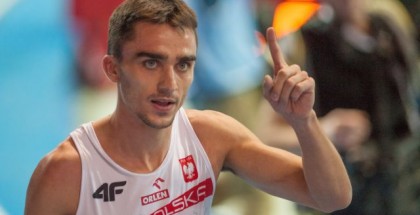26 thoughts from Olympic Trials Marathon
Kevin Sully | On 16, Feb 2016
Some leftover thoughts from Saturday’s Olympic Trials. Be sure to check out Jesse’s takeaways from the race, Brendon’s look at social media and our recap podcast featuring Sports Illustrated’s Tim Layden.
1) I know a good number of you thought Rupp would dominate the field, but did you think it would be that easy? Other than the final 180 degree turn, Rupp showed no strain at all. Not from the heat. Not from the distance. Not from the beautiful Los Angeles air. He ran like the best runner in the field. Whether that speaks more to Rupp’s potential or the current state of American men’s marathoning, I don’t think we know for sure yet.
It was striking how smoothly he covered all the moves and dropped Meb with four miles still remaining. Alberto Salazar said after the race that he’s capable of a 2:05 on a fast course. That doesn’t seem ridiculous after Saturday’s race.
2) In our post-race podcast, Tim Layden said that the tone of the post-race press conference made it seem like Meb won the race. Meb was well-beaten in the race, but if we really believe that third is as good as first, Meb did just fine. While he wasn’t in Rupp’s league on Saturday, he was comfortably ahead of everyone else. For a 40-year-old to be better than all but the best long distance runner in the country is remarkable. Meb is the oldest runner to make an American Olympic team–a footnote that perfectly sums up his career.
3) On the broadcast, Tim Hutchings was bullish about Rupp’s chances for a medal in the marathon. I’m still sticking with 10,000m as his best event because of his experience on the track and a deeper field, theoretically, in the marathon.
There is one thing working in Rupp’s favor in the marathon–the lack of a Trials race for Ethiopia and Kenya in the marathon means the possibility of a terrible selection process. That is exactly what happened in 2012, which is why not one of the three Ethiopian entrants finished the race. Perhaps they’ve wised up since then.
On the track there is a higher chance of the federations picking the best three because they have more races to learn about who their best runners are. If you like Rupp more in the marathon it’s because you think Saturday just scratched the surface of what he is capable of. That is a perfectly valid point I wouldn’t argue with because Mo Farah is in the 10,000, not the marathon.
4) The presence of a teammate is more valuable in the marathon than in any other event in track and field. Amy Cragg and Shalane Flanagan demonstrated the multitude of reasons why this is the case over the second half of the race. They led the breakaway together. They sped up the pace to make it just a two person race. Then, Flanagan slowed down when Cragg said the pace was too quick. Later, when it was Flanagan, not Cragg suffering in the final miles, the two stayed together with Cragg serving as a coach/lookout/motivational speaker.
All of the turning around slowed Cragg down, but the company was invaluable for Flanagan who was close to red lining and seeing her spot in the top three disappear.
5) Because she slowed down considerably to help her teammate, I’m curious what Cragg was capable of on Saturday if she ran it like any other race. Cragg helping Flanagan, instead of the other way around, was one of the few surprises of the race.
6) It was a rough finish for Flanagan. She collapsed at the finish line, had to be placed into a wheelchair and received an IV. After she recovered, she explained more about how she was feeling on Saturday. Warning: reading this will make you never want to run outside again unless accompanied by an umbrella or sun shield.
7) Visual evidence of number 6.
8) Like in 2012, there weren’t many upsets. The first four in the women’s race were the runners you’d expect and the three who qualified for the Olympics were consensus picks. Ritzenhein not making the team is somewhat surprising, but the man who got third wasn’t far off the radar.
9) Kara Goucher’s post-race comments about Galen Rupp and Alberto Salazar drew plenty of attention. Both sides are entrenched in their positions ahead of the completion of the USADA investigation.
Governing agencies, including anti-doping departments, have taken a bunch of credibility hits since the initial Rupp/Salazar report so whatever USADA rules will be greeted with skepticism. Hooray for closure!
10) As unpredictable as the prospect of a Olympic Trials race is, never underestimate its ability to pick the best team. Without knowing who Kenya or Ethiopia has selected, it’s hard to handicap the field yet. I think it’s fair to say that all six have a chance at the top ten. With Cragg’s rise (and Flanagan’s improved health) it’s not crazy to that all three of women have a chance at the podium.
11) There was some uncertainty over the final miles, but there wasn’t the drama and small margins that there were in 2012. The gap from Ward to Luke Puskedra and Flanagan to Kara Goucher both ended up being more than a minute at the finish.
12) Biggest what ifs? A couple nominees–if it was 50 degrees at the start instead of 70 would Ritzenhein’s race been completely different? If Deena Kastor was healthy, could she have caught Flanagan in the final mile? If Rupp didn’t decide to run a marathon, would Meb have runaway with the race or would someone else have filled the void?
13) With Rupp’s racing decisions undecided, fourth place in the men’s race was particularly important. Luke Puskedra got past Tyler Pennel for the alternate spot. Declarations for the U.S. team aren’t due until the day after the Olympic Trials in Eugene this summer so we won’t know anything official until then. If Rupp qualifies in both the 5,000m and 10,000m at the Trials, he will have to choose between the two double options for Rio. Since the marathon comes after the track races in the Olympics, I don’t see why he wouldn’t declare for the marathon. After Saturday’s win, I think it’s more likely that he’d drop the track races for Rio in order to be completely fresh for the marathon.
The top three in the women’s race are undoubtedly marathoners first. They might compete in Eugene this summer to get a nice 10,000m race in, but there isn’t the same ‘will he, won’t he’ factor hanging over the women’s field. Still, it’s the marathon and injuries and mishaps happen in training so the 4th/5th placing yesterday may make a difference.
14) Rupp wasn’t in the press conference when Meb was asked a question about the interaction between the two during the race. Throughout the race, Meb motioned several times to Rupp, directing him to run somewhere other than right on his heels. Meb described their mid-race chats as “Not a very friendly conversation.” I did not know Meb was capable of unfriendly conversations.
15) Confirmed, everybody loves Meb. The press conference included a question to all the athletes about how they felt about Meb. After everyone, including Rupp, gushed about Meb’s impact on the sport and how great of a person he is, there was a round of applause.
16) Many methods to stay cool on a hot day–some I’ve seen and some that looked brand new. Each water stop gave a chance for runners to give themselves a sponge bath. The holes in Rupp’s jersey was a throwback to how his coach tried to stay cool by chopping up his singlet. The sponge/towel biting was something new. Rupp didn’t get asked about it in the press conference.
I’m guessing that the benefit of sucking the water outweighs the discomfort of sticking a cloth in your mouth for a few seconds while your trying to race a marathon.
17) Considering the heat, the 10:00 a.m. start time was especially brutal. It wasn’t as hot as feared, but I was sweating standing at the starting line of the men’s race. The course didn’t provide much relief from the sun. Desiree Linden called it the hardest 26.2 of her life. February in Los Angeles is usually a good bet, however an 8:00 a.m. start would have been an even safer way to avoid the heat of the day. Jesse tackled the late start time issue, and four others, in his post from Sunday.
18) Dathan Ritzenhein didn’t go with escalation of pace at the 16-mile mark. At the moment it seemed strategic, but as the miles passed he was nowhere to be found. Eventually, he dropped out at mile 20. He was the best runner not to reach the finish line on Saturday. Given his personal best, and the optimism around his health entering the race, it was surprising that he didn’t have enough to cover the move initiated by Tyler Pennel that shook up the race. It had to be the heat that derailed his race. Ritzenhein was fit enough to deal with the change of pace at that point in the race. Now, his only chance for the Olympics is via the 10,000m this summer.
19) Other than Rupp, it wasn’t a great showing for the debutantes. Both Sam Chelanga and Diego Estrada did not finish the race. I can hardly think of more difficult conditions to try a marathon for the first time, both in terms of weather and the pressure of the occasion. If Saturday didn’t dissuade them, they will have much better race the second time around.
20) The DNFs weren’t as high profile in the women’s race, but the heat did claim Sara Hall who was with Kellyn Taylor, Shalane Flanagan and Amy Cragg in the initial breakaway. Hall began to fall off the pack around the 12 mile mark and eventually dropped out after 17 miles when her pace ballooned to 6:38.
21) Meb gave credit to Tyler Pennell for making the race when Pennell decided to be the one to break up the group around mile 16. Without Pennell, the group would have stayed intact for much longer as none of the big names wanted to make a move. Pennell ran with Meb and Rupp through 19 miles and looked like he might stick with the two favorites for much longer. At mile 19, he had 15 seconds on Jared Ward. But once Pennell fell behind Meb and Rupp, his lead disintegrated. By mile 21, he was more than 10 seconds behind Ward in fourth. To his credit, he stuck in the race and finish fifth.
22) I was standing at the two mile mark when the women’s pack flew past. At that point, it was clear that Desiree Linden’s had no interest in the lead, or even being in the top ten. She was tucked against the curb, already a decent distance behind Flanagan, Cragg and Taylor. To me, that was a show of confidence. Linden knew her path to the top three and was perfectly content to not be in the top 50 that early in the race. Her patience and poise continued throughout the race. When Taylor, Flanagan, Cragg and Sara Hall broke away, Linden stayed put. No need to worry.
She climbed back into the top three as others faltered around her. By the end, she looked the strongest in the entire field.
23) Jared Ward was a good distance behind Meb and Rupp, but Saturday vaulted him into the top tier of American marathoning. In his last two marathons he’s had to contend with horrible conditions. Coincidentally, both were in Los Angeles. I wonder what he could do on a fast course in good weather. That won’t be answered until after Rio. Ward ran a bit like Linden on Saturday. He trusted his response to the weather and bet, correctly, that others would unravel in the heat.
24) There are seven giant televisions at LA Live across from Staples Center. I hoped it would be used as souped-up version of Henman Hill at Wimbledon.
It’s proximity to the course meant someone could watch the leaders run in front of them on Figueroa Street and then walk a few feet and follow the race on the big screens until the race passed by them again. What was the perfect outdoor viewing area though did not exist because all seven monitors just showed an endless loop of commercials.
25) Two Ethiopian born women attracted interest in the lead up to the race. Neither ended up making an impact. Misiker Demisse dropped out at mile 9. Belainesh Gebre lasted until mile 18.
26) Marathon training doesn’t mean you get to neglect the weight room
-
All of us along the Blue Ridge in North Carolina were out of our minds when Tyler made that bold move. Of course we were saddened when he was unable to match Meb and Rupp, but it was
his second marathon and without checking all the stats, I’m wondering how many other runners were as close to their marathon pr as Tyler was. I’m very proud of him and the other competitors from ZAP in the race.



















Comments